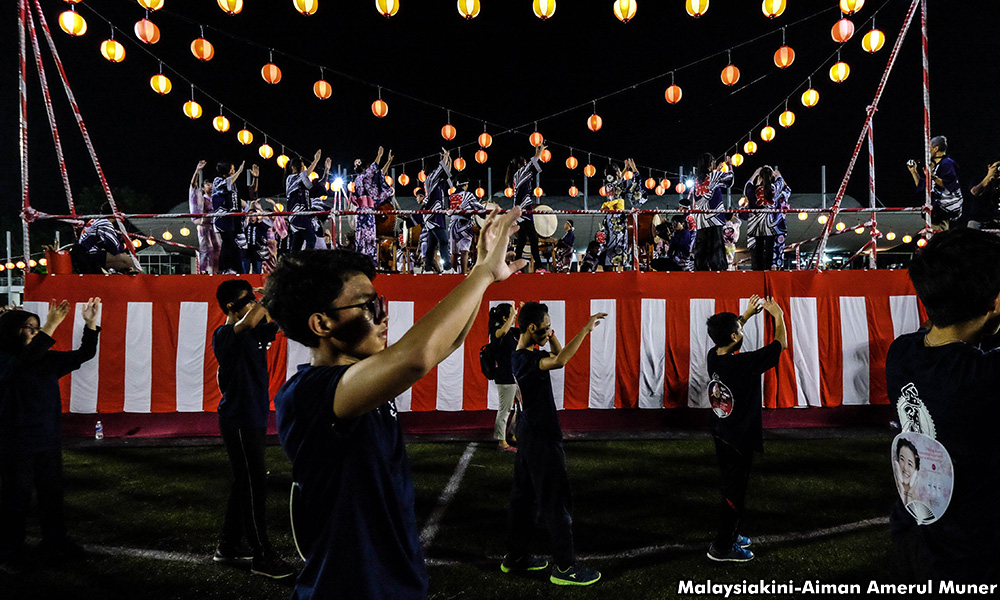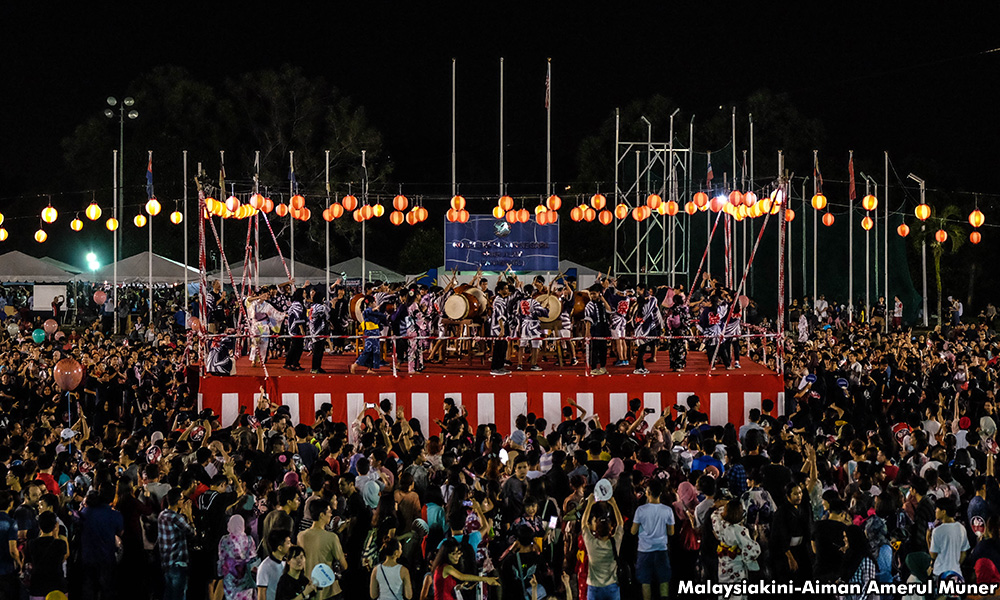Every year in July for the past 40 years, Malaysia never fails to celebrate the Bon Odori Festival, a religious ceremony that has flourished in Japan for over 500 years.
The festival reunites family and friends and is considered one of the most important festivals in Japanese society.
However, a study conducted by the Department of Islamic Development Malaysia found that Bon Odori contains Buddhist elements.
For that reason, Muslims in the country were advised not to participate in it or any programme that involves other faiths and religions.
Dissatisfied with the ban and the statement issued by the authorities regarding the celebration of the festival, Bon Odori participants came forward to express their dissatisfaction.
One participant is 44-year-old Ahmad Zaidi Masri.
Ahmad Zaidi, who was a former Mara-sponsored student sent to Japan and is now a burger chain entrepreneur in Malaysia, questioned why the ban was made now.
“Bon Odori has been going on in Malaysia for 40 years. It is a Japanese cultural event in Malaysia where the girls wear the beautiful yukata (summer kimono).
“Surely it wouldn’t have been held in Malaysia for 40 years without any religious leader being aware of (anyone) deviating from their beliefs? Is there a political motive?” he asked.
According to Ahmad Zaidi, he and his family celebrated the festival to learn about the land of the rising sun’s culture.
“We went to Bon Odori to learn Japanese culture while eating takoyaki and onigiri.
“Technically, ‘Obon’, the actual ceremony, takes place every mid-August, so the date July 16 is not authentic,” he said.

‘Worrying about trivial things’
On the possibility of festival-goers deviating from their beliefs, Ahmad Zaidi said people shouldn’t be bothered with trivial matters.
“The minister said, ‘Don’t go to Bon Odori. You might deviate from your faith.’
“I hope the same minister also works hard to use his brain to help the rakyat to live more comfortably instead of worrying about trivial things,” he said.
Ahmad Zaidi also pointed out that on television programmes such as TV3 drama “Samarinda” and “Anugerah Juara Lagu”, there’s dancing, hugging and unrelated celebrities holding hands.
“Try asking the minister for ideas on business, science and technology or ways to overcome hyperinflation,” he said.
Recently, Religious Affairs Minister Idris Ahmad had advised Muslims not to participate in the Bon Odori Festival on the grounds that it was “a Japanese Buddhist festival to honour the spirit of their ancestors”.
According to Idris, research conducted by Jakim confirmed that Bon Odori contained influences from non-Islamic religions.
A celebration of customs and culture
Meanwhile, another festival-goer, who only wanted to be known as Rizal, said he attended the Bon Odori festival for the first time in his capacity to do his final year dissertation nine years ago.
Rizal, who is taking an executive diploma course in Creative Photography and Digital Imaging at Universiti Teknologi Malaysia, was happy to participate in the Japanese ceremony.
“It was a fun experience to meet fellow photographers as well as Japanese acquaintances who attended the festival.
“I was thrilled when a colleague at my Japanese-owned company, Amano Malaysia Sdn Bhd, gave me the opportunity to photograph this festival as the Japanese themselves who work and live in Malaysia prepared to celebrate this festival with their families at their homes,” he said.
According to Rizal, who has participated in the ceremony six times, the festival is not a religious festival. He said the celebration was just a celebration of Japanese culture.
“As far as I know, after asking a Japanese colleague, this festival is not a religious festival but a celebration of customs and culture.
“For the Japanese, Bon Odori is a festival that is as old as their ancestors, to celebrate the Japanese people or people who emigrated from Japan.
“To seek sustenance or other affairs whether living or dead,” he said.
Rizal said the participants of the festival would dance to the beat of drums in a circle surrounding the drummers.
“The peak time for the show is during the sunset. While wearing traditional Japanese clothes isn’t mandatory, people wear them because they are proud of their traditional clothing,” said Rizal.

Commenting on the government’s alleged ban on Muslims in the country, Rizal said Bon Odori was not a religious ceremony.
“They (Japanese people) also have no objection if there are locals who are not among the Japanese and not from their religion to join the celebration because Bon Odori is a non-religious cultural festival.
“If the religious minister advises on supertitles (sic), then it should be debated first. In my opinion, the religious minister only gives opinions and advice, then it can be discussed in order to find a good answer to his opinion,” he said.
Just hanging out with friends
Another attendee also shared a similar feeling of excitement about participating in the Bon Odori festival.
The festival-goer, who only wanted to be known as Aiman, said he was present at the festival to experience Japanese culture for himself as well as to socialise with people from different races.
“I went there with friends in 2019. The traffic was really bad, and it was very difficult to get parking.
“There are so many food trucks and stalls selling local and Japanese cuisine. Some stalls also sell traditional Japanese clothes and accessories for those who come last minute to join the festival. We later joined in on the dancing and singing.
“We came to experience the fun of the festival, to learn about the culture and for the most part, just to hang out with friends,” he said.
Aiman added what attracted his attention was that while foreigners organised the festival, the organisers were still concerned with the needs of its Muslim participants.
Aiman said the organisers have, in the past, provided a prayer space for those wishing to fulfil their religious duties as Muslims.
“I have always believed that what matters is my intentions,” he said succinctly.
The Bon Odori Festival is considered one of the most important festivals for the Japanese community and is celebrated every July.
Among the activities carried out include dancing, singing, drum performances and Japanese drums with a focus on the Obon dance.
In Malaysia, annual Bon Odori events are organised in Penang, Sabah and Selangor.
The festival held in Selangor - often seen as the largest outside Japan - is organised by, among others, the Kuala Lumpur Japanese Club and the Embassy of Japan and has the support of the Selangor state government.
The annual festival is held at the National Sports Complex, Shah Alam.
The highlight of the event is a dance around a stage for music performers. Stalls selling Japanese food often accompany the event. - Mkini



No comments:
Post a Comment
Note: Only a member of this blog may post a comment.